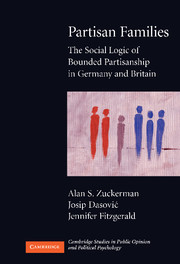Book contents
- Frontmatter
- Contents
- List of Figures and Tables
- Acknowledgments
- Preface: The Theoretical Approach, the Question, and the Data
- 1 The Social Logic of Partisanship: A Theoretical Excursion
- 2 Bounded Partisanship in Germany and Britain
- 3 A Multivariate Analysis of Partisan Support, Preference, and Constancy
- 4 Bounded Partisanship in Intimate Social Units: Husbands, Wives, and Domestic Partners
- 5 Bounded Partisanship in Intimate Social Units: Parents and Children
- 6 Partisan Constancy and Partisan Families: Turnout and Vote Choice in Recent British Elections
- Conclusion: Family Ties, Bounded Partisanship, and Party Politics in Established Democracies
- Appendix
- References
- Index
- Books in the Series
Appendix
Published online by Cambridge University Press: 05 June 2012
- Frontmatter
- Contents
- List of Figures and Tables
- Acknowledgments
- Preface: The Theoretical Approach, the Question, and the Data
- 1 The Social Logic of Partisanship: A Theoretical Excursion
- 2 Bounded Partisanship in Germany and Britain
- 3 A Multivariate Analysis of Partisan Support, Preference, and Constancy
- 4 Bounded Partisanship in Intimate Social Units: Husbands, Wives, and Domestic Partners
- 5 Bounded Partisanship in Intimate Social Units: Parents and Children
- 6 Partisan Constancy and Partisan Families: Turnout and Vote Choice in Recent British Elections
- Conclusion: Family Ties, Bounded Partisanship, and Party Politics in Established Democracies
- Appendix
- References
- Index
- Books in the Series
Summary
THE SURVEYS
Full descriptions of the German Socio-Economic Panel Study and the British Household Panel Survey, the samples, questions, constructed variables, and weighting variables may be obtained from the respective Web sites; for Deutsche Institut für Wirtschaftsforschung (DIW Berlin) go to http://www.diw.de/GSOEP, for the Institute for Social and Economic Research at the University of Essex, go to http://www.iser.essex.ac.uk.
We describe the measures of partisan support, choice, and constancy in the Preface. Some measures (age, partisan preference in the region of residence, the Goldthorpe categories of occupation, household income, education category) are readily interpreted. Other technical matters need elaboration. Some variables like the measures of partisanship are asked each year. When we use a variable that is asked intermittently, for example religious identification, we impute forward the first response until the next time that it is asked. Omitting it from the analysis would skew and drastically reduce the size of the two samples.
REGARDING THE DATA TAKEN FROM GSOEP
A German is a person who (a) was born in Germany, (b) has only held German citizenship, and (c) lived in the Federal Republic of Germany (FRG) in 1989.
We use the English translation of GSOEP's survey in order to describe the measures. The following question defines political interest: “First of all in general: How interested are you in politics?” Then the respondents are offered the following choices: “Very interested [4 points], fairly interested [3 points], not very interested [2 points], and not interested [1 point].”
- Type
- Chapter
- Information
- Partisan FamiliesThe Social Logic of Bounded Partisanship in Germany and Britain, pp. 161 - 166Publisher: Cambridge University PressPrint publication year: 2007



